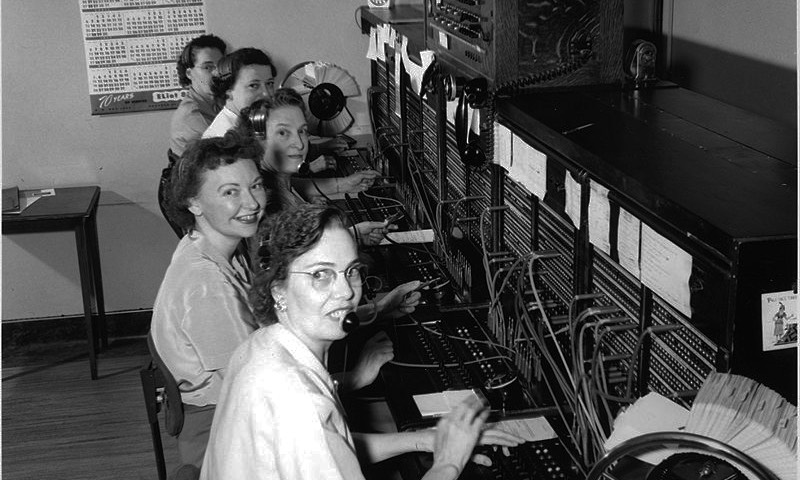Top 5 tips for small businesses when relocating to avoid extra expenses & communication downtime
Learn how to avoid unwanted costs & prevent communication failures when moving in this blog post with r top 5 tips for preventing expenses from spiraling out of control.
I'm sure you know someone in your life who's resistant to change. Some folks like consistency, whether it's ordering a similar meal at a restaurant, or getting comfortable with their commute to work every morning. Regardless of whether or not you like constants in your life, we all know one fairly major change can be a major pain.
Moving.
Did you know that most people in this world consider moving to be the 3rd most stressful event in their lives? The only things worse, according to these folks, is death or divorce. Rough, right?
The truth of the matter is, moving can be a burden. It can impact communication, disrupt business, and god forbid something goes wrong or goes missing, can really impact your bottom line.
Fortunately, when it comes to your communication and moving, there's 5 things we usually recommend clients ask themselves before they start packing up their desk and taping boxes closed. We've found these 5 items help clients avoid annoying & unwanted expenses, and prevent communication failures and downtime as much as possible.

1. Is it time to upgrade to a VoIP phone system or keep what we have?
An office relocation is an ideal time to reassess your communications needs & determine what will not only benefit you the most, but what will help your customer & staff the most as well.
Why? Simple, because moving a traditional, premise based phone system is a nightmare. First, you never know what will happen when you unplug a 10+ year phone system and reboot it in a new office. Or, if you can find local support for that system in a new office. If some unforeseen technical problem prevents you from turning everything back on, you could be looking at a massive communication failure.
When it comes to moving your existing phone system, you can almost bank on the transfer of equipment, devices, and service taking around 4 to 16 hours. Meaning, you can pretty much guarantee an entire day will go by without the phone ringing. That's generally not a good thing.
There's some easy questions you can ask yourself about your traditional premise based system right off the bat to determine the true price (and I don't literally mean the dollar amount) to move your system
- How long are we expecting the business to be without reliable communication?
- Does our system have manufacturer support or warranty in case something goes wrong?
- Is there a local service provider or company who can uninstall & then reinstall my system? And, do they know what they're doing? IE, are the specialists?
- Will this new company support the product for years to come? How much longer can I expect to successfully use my phone system?
- How much is this move going to cost me?
These question can help you identify just how much time & resources are going to go into moving your communication system.
With VoIP phone systems, most of these questions aren't an issue because VoIP has some amazingly simple benefits which can greatly impact your business and keep you in reach of your customers at all times, even during a chaotic move.
- Your new system can be installed & fully functional as soon as you have a reliable internet signal.
- Since VoIP phone system are easier to use than traditional systems, you can bank on less time necessary to setup your communications.
- In case of a lack of power or internet, calls can be forwarded to cell phones, softphones, or straight to voicemails, which are then emailed in audio format to your email address
- IP phones can be used virtually anywhere that has a stable internet connection. Meaning, you can plug-and-play phone can work anywhere, including home.
A lot of our customers come to us in the midst of a move after identifying and asking themselves similar questions above, and generally find that during the moving period is one of the most ideal times to switch to a VoIP phone system. We like to tell folks the best time to upgrade to a VoIP system is whenever's right for them, but there's honestly some better times than others to make the switch, which we cover in our article When is the best time for my business to upgrade to a VoIP phone system?
2. Can I still get emails & critical information during a move, relocation, or transition?
This is going to depend entirely on one thing. Is your email hosted internally or on the cloud? Are you using premise based servers for email, file sharing, CRM, accounting, etc., or are you using cloud-based services?
Now when I say cloud that could be anything as specific to customized cloud-based email or file storage solutions, to something as simple as Gmail and Google Contacts, for example.
If you're using premise-based servers, expect downtime. Just like your phones, expect anywhere from 4 to 16 hours of communication downtime.
Additionally, for premise-based servers, you're going to need an IT vendor to be with you during the initial setup & instillation of the new office. If you're moving far, you're going to need to scout ahead in your new location for a new IT vendor. They can help you identify what needs to happen in the office (such as if you need to upgrade any wiring in the office, for example), as well as figure out what's reusable, and what should be replaced or upgraded. Additionally, your new IT vendor will get things up and running for you.
However, if you're using cloud based solutions for email & other critical elements of your data-storage and day to day operation of your organization, you're in luck. When you move from the old office to the new office, as long as you have an internet connection, you'll have everything at your fingertips right away. Meaning, no downtime. Since time equals money, this can, and normally does, mean you can stay productive and keep business running as usual.
3. Will my customers & clients still be able to call us during our move?
Again, it depends!
If you're using traditional phone services, meaning you're on analog phone lines or on a T1 circuit, you might have an uphill battle. You'll need to ask your current carrier provider about forwarding the lines. If they can't do that, chances are you customers may hear a busy signal.
Bear in mind, there are potentially expensive fees involved in forwarding analog or T1 lines which you should be aware of. These are called RCF fees.
Additionally, you should be aware that some providers have limited forwarding capabilities. Meaning, some clients may not be able to reach you during the transition.
How do you get around this? VoIP service.
You can upgrade your current system to VoIP/SIP prior to the move (meaning upgrade your office before you move), because you'll have the availability to have flexible call routing. This means during your move you'll be able to route your calls to your cellphone, your new office (assuming you have the internet there), your home phone, your satellite office, etc.
Since VoIP phone service is interned based, there are no physical limitations and no call-forwarding fees. Long story short, you won't miss calls, and you'll end up saving some money.
On a semi-related note, don't forget about faxing, especially if faxing is a big component of how your organization communications with your clients and customers. We recommend forwarding your fax machines to a web fax, so when you move all your inbound faxes will be converted to email instead.

4. Have you planned out your wiring infrastructure for things like phones, computers, network printers, and faxes?
It's vital that you determine where your VoIP phones, computers, network printers, and faxes will be. You need to plan out a "blueprint" of your networking, meaning wiring, routers, switches, etc. Here's why:
- Low-voltage wiring and cabling is often left to the last moment in many leases. Depending on your situation and existing infrastructure, it can be a competitive lever when negotiating your lease with landlords.
- In most instances where folks are moving into an existing office building, it's very common for cat3 wiring to exist. Depending on the infrastructure you're brining and the IP-based environment, cat3 might not cut it. You're going to want to get estimates on cat5e and cat6 wiring.
- Plan ahead if possible. If you're expecting growth, consider what kind of realistic expansion you can expect. Think 3 to 5 years down the road, and to the extent possible, have the proper cabling for future expansion.
- If you're having your office built out, cable the office as you see fit ahead of time. It drastically reduces your costs to lay cable while building an office versus running lines in the walls after the fact.
While cabling is vital, there's a related component you need to consider as well. Your hardware. If you're dealing with an IT vendor they'll be able to assist with this step, but regardless you need to identify what hardware you're using, and whether or not it's going to be compatible with your new wiring. We cover this topic more in-depth in our article Will existing phone hardware work with a new VoIP phone system? You need to make sure your IT hardware and network infrastructure is going to work with everything you're planning at your new location.
5. Have you evaluated your internet options & backup plans?
As much as we like to think we live in the most advanced nation on the planet, the fact of the matter is depending on where you move, your options for internet packages can vary wildly.
If you're a company that uses VoIP and relies heavily on a good internet connection for communication, then you need to very carefully determine which ISPs are available at your new office site.
Fortunately, in New Jersey this is a pretty easy task because your options are generally going to be Cablevision, Comcast, and Verizon FiOS. Additionally it may be worth evaluating what Data T1 and fiber options are available, depending on your size and needs.
Just a word of warning for anyone using a public ISP; it is very common for the internet to be slow around 3:00pm daily. Why? That's when students get home from school, and network congestion can occur.
We commonly recommend (for multiple reasons, one of which we go into in our article on What happens to the VoIP phone system at my business if the internet goes down?) a backup internet connection. It could be with another ISP if that’s available (for example, you could have a high-speed internet connection with both Verizon & Comcast). Or, and what we recommend to organizations that absolutely need the assurance they will never, ever have issues with their VoIP phone system, is a private internet connection. This is referred to as a MLPS circuit, which is basically a private connection to the internet which is extremely fast and extremely reliable. The only down-side? It can be a little expensive.

When moving your small business, keeping costs & expenses under control is a must.
Moving is hectic. Chaotic. Things go missing, something ends up breaking, and there's invariably a problem with something. Wherever and whenever possible, you want to take the unknown out of the situation, and make sure you're properly set up to hit the ground running at your new office on day one.
So while we're not experts on moving, we are experts on VoIP communications, and want to see you get through your move, from a communication and technical standpoint, as smooth as possible.
To learn more about how to keep things going smooth during your move, feel free to contact us online, shoot me an e-mail directly at vin@tele-datasolutions.com, or give me a call on my direct line at 908-378-1218.
 By Vincent Finaldi
By Vincent Finaldi
Vice-President, Tele-Data Solutions
E-mail: vin@tele-datasolutions.com | Direct Line: (908) 378-1218
What brings me satisfaction is meeting with New Jersey–based businesses and genuinely helping them solve communication and business problems. As someone who has lived in New Jersey my entire life, I love working and playing here. I live in Morristown with my wife, Lisa, and root for the New York Giants.


